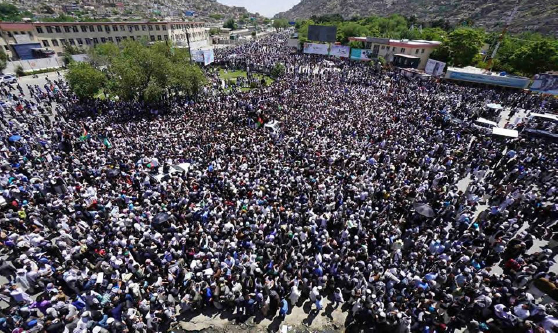
Why Hazaras Are Supporting The U.S., But Not Iran?
Reading time: (Number of words: )
by Nasim Fekrat
In my previous blog post, I argued that Iran has not been successful in exerting its influence through the Hazaras in Afghanistan, despite its strong historical, cultural, linguistic, and religious ties with them. In this post, I will elaborate my argument about the extent to which some historical events, particularly during the Taliban regime contributed to Hazaras’ awareness, which eventually led to changes in their attitudes and their political behavior toward Iran. In the next blog post I will review some opposing arguments, but first, let me straighten out why this political divorce have happened and why the Hazaras are mistrustful of Iran.
To find an adequate reason to why Hazaras refused and warded off Iran’s infiltration and noxious intention of fueling anti-American sentiment in Afghanistan, we have to look at some historical events that led to such drastic changes.
In November 1998, when the Taliban force took over the city of Mazar-e Sharif for the second time, the chauvinist governor of Balkh, Mullah Manan Niazi, announced that the Hazaras are infidels and killing them is not a sin. Niazi then gave Hazaras three options: convert to Sunni Islam, leave the country, or die. The Hazaras did not leave, nor converted into Sunni Islam, but then, the death arrived. According to Human Rights Watch (HRW) between 1998 and 2001, the Taliban massacred thousands of Hazaras and burned down their houses in Mazar-e Sharif (read HRW report on Mazar-e Sharif massacre) and Bamiyan (read HRW report on one of Bamiyan’s district massacre). Thousands of people fled their homes and others displaced at large-scale. Iran kept quiet as Shiite Hazaras were slaughtered by the Taliban regime.
It was the 2001 U.S. presence in Afghanistan that saved millions of Hazaras from ethnic cleansing. When the U.S. forces entered Afghanistan, the Hazaras were the first to welcome the U.S. presence in their country. In 2003, after the provisional government was established, Hazaras were the first to voluntarily join the disarmament process in order to cooperate with the transitional government. In November 2013, when Karzai convened a national assembly on a bilateral security agreement with the U.S. that would let the United States to leave some troops beyond 2014, the Hazara delegates overwhelmingly endorsed the deal. Not only that, according to the Wall Street Journal, the Hazara delegates even urged the United States to open a base in Bamiyan.
Today, the Hazara minority group that has faced long-term persecution, fears that the Taliban regime will return and is therefore a strong supporter of the U.S. troops’ presence beyond 2014, which is contrary to Iran’s policy in Afghanistan. Iran wants the U.S. to leave Afghanistan because it fears that Afghanistan might be used as a platform for attacking it.
The Hazara people have been aware of Iran’s intention in Afghanistan and they have realized that what Iran wants in Afghanistan is against their national interests. Therefore, if anyone wonders why Hazaras have distanced themselves from Iran, they should look at the events that directly affected the existence of Hazaras in Afghanistan. The fact that how much Hazaras have been enjoying the past decade of status quo, highlights the changes in their attitudes, and behavior toward Iran.

View online : http://www.hazarapeople.com/2015/02...

Poems for the Hazara
The Anthology of 125 Internationally Recognized Poets From 68 Countries Dedicated to the Hazara
Order Now








